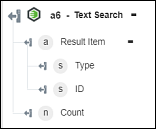Text Search
Use the Text Search action to search the text as per the specified scopes in the long-text and short-text fields.
Complete the following steps to use the Text Search action in your workflow:
1. Drag the Text Search action under Windchill RV&S to the canvas, place the pointer on the action, and then click  or double-click the action. The Text Search window opens.
or double-click the action. The Text Search window opens.
2. Edit the Label, if needed. By default, the label name is the same as the action name.
3. To add a Windchill RV&S connector type, refer to Supported Windchill RV&S Connector Types.
If you previously added a connector type, select the appropriate Connector Type, and under Connector Name, select the connector.
4. Click TEST to validate the connector.
5. Click MAP CONNECTOR to execute the action using a connector that is different from the one that you are using to populate the input fields. In the Runtime Connector field, provide a valid Windchill RV&S connector name. For more information about MAP CONNECTOR, see Using Map Connector.
6. In the Search text field, enter the text that you want to search. This text is searched against the long-text and short-text fields only.
7. In the Scope list, select the search scope.
8. Under the Order By group, do the following:
a. In the Attribute list, select the attribute by which you want to sort the result.
b. In the Order list, select Ascending or Descending.
This sorts the contents of the Attribute column in the selected order.
9. Click Show additional fields.
10. Under the Attributes group, click Add, and in the Attribute list, select an attribute. It is mandatory to select at least one attribute.
Click Add to add multiple attributes. Click  to delete attributes.
to delete attributes.
11. In the Limit field, enter a value up to 200 that specifies the number of rows that you want to get in the result.
By default, this action returns only 25 records.
12. In the Skip field, enter a value that specifies the number of rows that you want to exclude from the result.
13. Click Done.
Output schema
The Text Search action returns an output schema, as shown in the following figure:
